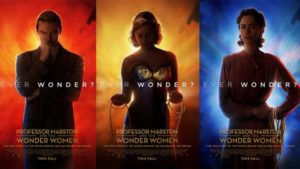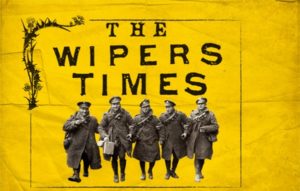 (4.5 / 5)
(4.5 / 5)
Continue reading Video Captioned Review of “First Man” watched at Chapter by Roger Barrington

 (4 / 5)
(4 / 5)
She is one of the most iconic female characters in pop culture. She is instantly recognisable and you most likely know her name. She stands for truth. But in creating her secrets had to be kept to preserve love.
Earlier this year the mass audience were introduced to Wonder Woman through her first film. Now she is more popular than ever, this is the perfect time to tell this fascinating story of the deep psychological ideas that went into her creation and first few stories as well as the just as interesting behind the scenes situation of the people that inspired her.
The man who co-created her was man named William Moulton Marston (Luke Evans), a university professor who teaches psychology. He would go on to invent the lie detector machine. While there with his wife one of his students catches his eye. His classes teach about the mindset of giving yourself up to an authority figure in a relationship.
Elizabeth (Rebecca Hall) is his official wife whom he has known since childhood, she has dark hair and is more than qualified to be a lecturer at any University, but because she is a woman she cannot gain any diploma. Her and Marston enjoy heated debates. Olive (Bella Heathcote) is blonde, a few years younger and even though she is descended from two of the most outspoken and radical feminist of her time was raised by nuns so is timid and tacked but still very intelligent.
He loves his wife, however he also loves Olive and they love him as well as each-other. What are they to do? The love is real but the society in-which they live will never accept them, is it even worth trying?
Luke Evans himself is a gay man and the writer/director Angela Robinson is a lesbian. They are both open about their sexuality but the world still does not fully embrace people of non hetero sexuality so they are probably the perfect people to tackle this material.
Adding to the revealing nature of the movie is the layering of the actual Wonder Woman comics that were written by Marston and indeed do feature Wonder Woman herself and other women caged, tied-up, spanked etc. The fact that they were able to get approval for the actual material shows and bravery and how unashamed on behalf of DC Comics. This is the story and ideas that went into the character and are addressing it.
The theory of loving submission isn’t just all about getting tied-up and/or spanked (though the physical acts are a part of it) it is about letting go of control, it has been said that you cannot love someone and control them, the acts allow the others to be the master to ones who would otherwise not be.
Being that this takes a look behind the public perception of a famous character and shows the story of the real people behind the scenes one will probably be reminded of Hollywoodland (an equally good movie).
This movie tells the story of love that is still rather unconventional now and seemingly impossible at the time it happened. There are details about the production of the character of Wonder Woman that are skimmed over as well as a few other moments that take a leap in time in order to fit the correct running time. But the story it tells is one of love and understanding and it effectively conveys that message.

Jonathan Evans

 (4 / 5)
(4 / 5)
By Ian Hislop and Nick Newman
Based on a true story from World War I, The Wipers Times is an insight as to life and amazingly laughs in the trenches.
Following the discovery of a printing press and indeed paper during an advance, Officers’ Captain Roberts and Lieutenant Pearson decide instead of allowing it to be smashed and pieces used to bolster trenches that they would use it to produce a publication and bolster the moral of the men instead.
The publication, The Wipers Times, quickly gained notoriety and a following in the trenches which in the dreadful and soul destroying conditions the men were in must have been a tonic in itself.
There is something typically British in the way that the men went about ensuring that the Times was printed no matter what and despite disapproval by the senior officers it became something for the men to look forward to and for the editorial team and production team something to lift spirits and keep going for.
Ian Hislop and Nick Newman must be commended for the wonderful way that they have brought this story not only to the stage but also into the public consciousness. Roberts and Pearson were real people who certainly made a great contribution to the moral of the troops and did by the vehicle of their publication encouraged many soldiers to write.
Hislop and Newman take little credit for the written material of the play. Instead they let the content of memoirs of the men who were there and the Wipers Times tell the story for them.
The set was atmospheric and with minimal and slick scene changes were accompanied by the men singing war time song, which were actually poems that has been published in the Wipers Times set to music.
James Dutton and George Kemp gave credible performances as Roberts and Pearson, that said Officers’ are only as good as the men they command and the cast brought the soldiers from the past to the stage to warm our hearts and to believe that in the face of adversity their strength of character and determination was what got men through these most dreadful of time.
Dora Schweitzer (designer), James Smith (lighting), and Steve Mayo (sound) are to be commended for an exceptional job of giving us a true feel of life at the front line which was believable and bearable.
War of course is not clever, not funny and is certainly not a holiday destination. In the blackness of war The Wipers Times was an antidote to the reality of the horrors surrounding them and the awfulness of everyday life. In true British style humour is what keeps us going and the more inappropriate and condemed by the ‘establishment’ the better we like it.
At the beginning of the evening I felt a little uncomfortable in even considering the war to be funny but as a true brit it wasn’t long before I, along with a packed auditorium, was laughing and indeed wanting more.
After the war Roberts and Pearson returned to civilian life and to occupations they were both familiar with.
The Wipers Times is their legacy of life and laughs in the trenches. The discovery of the printing press was by chance but the production of the paper was a concious decision to try to make best of things and to improve the mens’ moral.
It is thanks to Hislop and Newman that these two men will be remembered and after far too long Roberts and Pearson were recognised by the Times broadsheet newspaper when they published obituaries for the men.
Us Brits are a strange breed and our humour often does not transfer to other nations well. However, amidst the laughter, we must be thankful for all those men who gave their lives so that we can enjoy the freedom to laugh at the things we do.
And to people such as Messrs Roberts, Pearson, Hislop, Newman and all the anonymous men who have produced humour in uniform, we salute you.